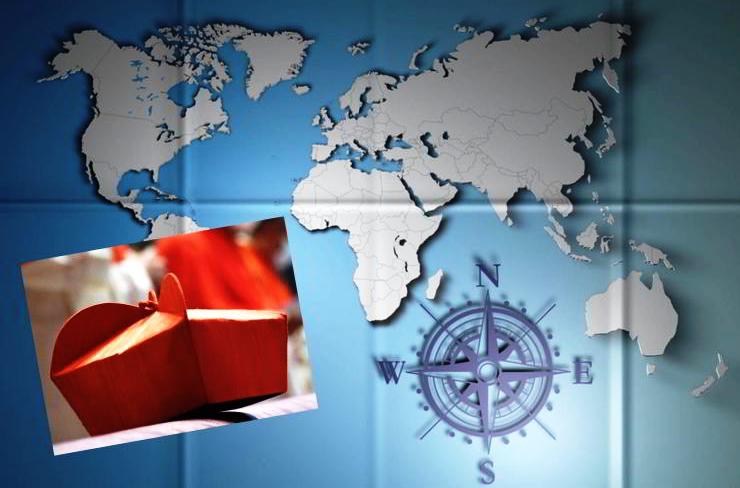On December 7, the Pope will create 21 new cardinals. Between Iran and Indonesia, Japan and the Philippines, Ivory Coast and Algeria, Francis confirms the universality of the Church
Once again, Pope Francis favours all corners of the world, realities of high symbolic value, places where Catholic minorities represent processes of peaceful coexistence and development for their countries, but there are also metropolises or difficult political and social contexts, where “the periphery becomes the centre”.
The new cardinals: ten are European, six from the American continent, of which five are South Americans and one from Canada, four Asians, one African. With an average age between sixty and seventy. During his pontificate, Pope Francis has tried to rebalance the forces of the College by designing it on the size and face of the world, reducing the number of Europeans and distributing appointments in other continents.
Now the College of Cardinals will be composed of a total of 256 members, of which 141 will be electors and 115 non-electors, a figure that sees the ceiling of 120 cardinal electors, according to the norms established by Paul VI for the Conclave, broken through not for the first time. With this Consistory, however, Francis, as he did with the first in 2014, wants to leave a lasting mark on the future. The cardinals he has created will thus make up eighty per cent of the electors in a possible Conclave. Many are relatively young.
Africa will have two new cardinals. Monsignor Jean-Paul Vesco, O.P., Archbishop of Algiers (Algeria) of French origin and Monsignor Ignace Bessi Dogbo, Archbishop of Abidjan (Ivory Coast).
Monsignor Vesco says: “This appointment is a commitment of my entire episcopate in favour of synodality, in favour of greater space given to the laity and to women in the Church… I therefore see these two faces: on the one hand the periphery, Algeria and dialogue with Muslims. On the other hand, a commitment to a vision within the universal Church. The Pope is leading us toward a change in the relationship of the Church with the world.”
Speaking of the church in Algeria: “We are a fragile church, small and at the same time in dialogue with the Muslim world. It is a bit like the choice of countries that the Pope visits on his travels. There has been a profound coherence since the beginning of his pontificate, in this sense. Our reference text, the most important one, the one that touched me the most, is the Declaration on Human Fraternity, signed together with the Grand Imam of Al Azhar because it places friendship at the centre of interreligious and Islamic-Christian dialogue. This is exactly what we try to live because I think there is no other way.”
There is only one African in the list of new cardinals: Mons. Ignace Bessi Dogbo, current Archbishop of Abidjan. His appointment as a cardinal came completely unexpectedly but it is an important sign for the whole of Ivory Coast. The bishop hopes to be able to put the African regions affected by terrorism, particularly West Africa, back at the centre of the agenda and international attention.
Cardinal Fridolin Ambongo, president of the Symposium of Episcopal Conferences of Africa and Madagascar (SECAM), sent a congratulatory message to the new cardinals from Africa, on behalf of the Cardinals, Archbishops and Bishops members of SECAM. “I offer you my sincere congratulations on the elevation of each of you to the dignity of Cardinal and wish you a fruitful ministry and full success in your mission to serve the Universal Church and the people of Africa”, wrote Cardinal Ambongo, Archbishop of Kinshasa.
He then expressed his “Deep gratitude to the Holy Father for his solicitude towards the Catholic Church on the African Continent” and prayed that the Lord may send them his Spirit, making them “tireless witnesses of the Risen Christ and bearers of messages of hope, peace and brotherhood in our Continent which is faced with the horrors of war and poverty”.
In the meantime, while waiting for the consistory, Pope Francis meanwhile sent a letter to the future cardinals in which he tells them to pray that the title of “servants” overshadows that of “eminences”.
The Pope writes: “When you are created a cardinal, you will become part of the clergy of Rome. Welcome! A membership that expresses the unity of the Church and the bond of all the Churches with this one of Rome. I encourage you to ensure that your cardinalate embodies those three attitudes with which an Argentine poet (Francisco Luis Bernárdez) described Saint John of the Cross, but which are also appropriate for us: ‘Eyes up, hands joined, feet bare’.”
The Pope specifies, “Eyes raised because your service will require you to broaden your gaze and dilate your heart, to be able to look further and love more universally with greater intensity. Enter the school of His gaze (Benedict XVI) which is the open side of Christ.”
The Pontiff continues: “Hands clasped, because what the Church needs most – together with the announcement – is your prayer to shepherd Christ’s flock well. Prayer, is the scope of discernment to help me seek and find God’s will for our people, and follow it.”
And finally: “Bare feet, touching the harshness of the reality of so many corners of the world stunned by pain and suffering due to war, discrimination, persecution, hunger and many forms of poverty that will demand so much compassion and mercy from you.” (Photo: Pixabay) – (C.C.)






